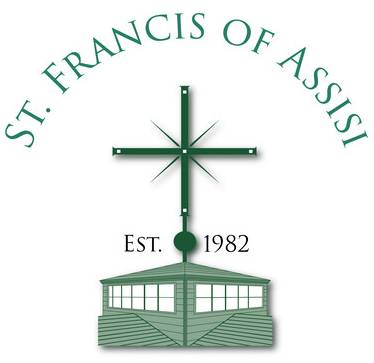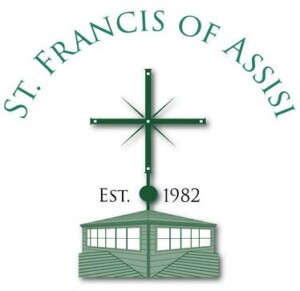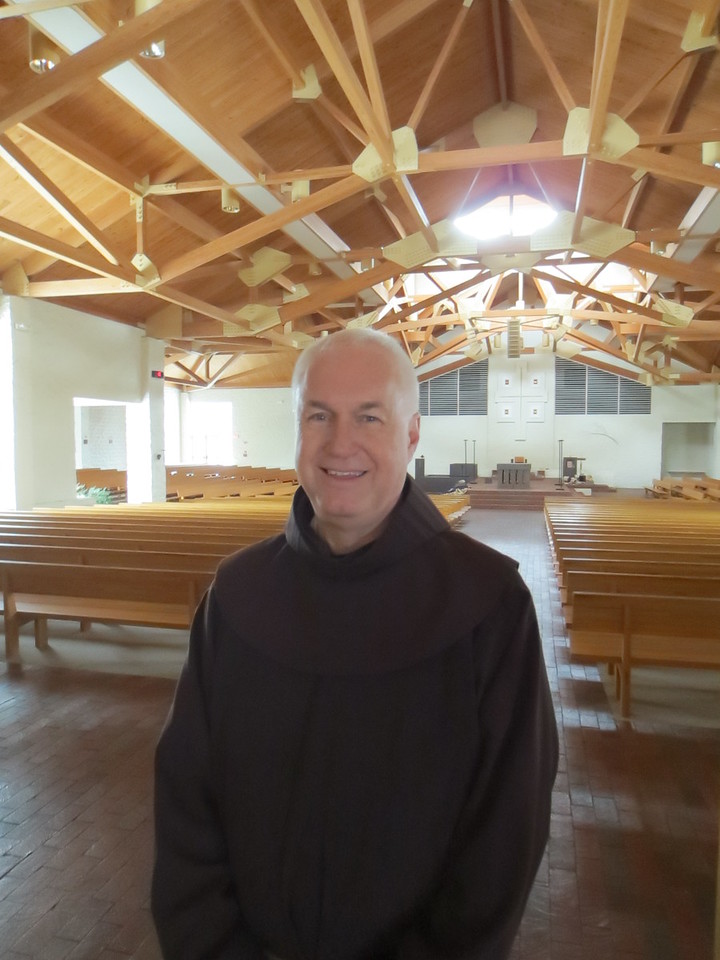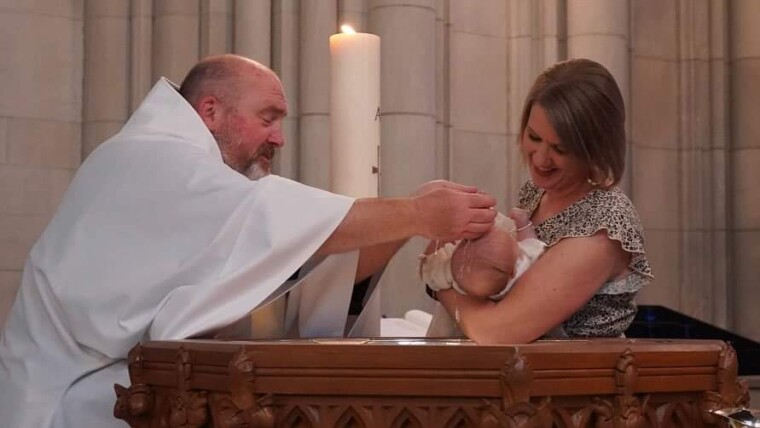“All saints point to Christ, but we focus on the saint. We aren’t supposed to live ‘Francis’ but are supposed to live Christ.” So stated Father Steve Kluge when he visited St. Francis recently to present his thoughts on ‘Living Christ with a Franciscan Heart’ to the parish. During his years here at St. Francis, Father Kluge referred to those at Mass as the ‘Saints of God.’ While here, he expounded on this idea many times, but do you recall why we are the ‘saints of God’? Father Kluge, now at Sacred Heart Parish in Tampa, Florida, returned to Raleigh on February 11th to share his well-known wisdom with his former parish. During his talk, he expanded on how we can ‘live Christ’ with Francis, addressing several aspects of living a Franciscan life and reminding us not to forget who we are.
Father Kluge reflected on St. Francis Parish and our Franciscan roots. “St. Francis Parish is so Franciscan, and they don’t know it.” When asked to explain that thought, he mentions that “he hopes people know that even though the friars aren’t here, the parish still lives a Franciscan life…a Christian Life with a Franciscan flavor.” He shared that he often borrows a story from a rabbi about what is the greatest sin. People tell the rabbi their thoughts about the greatest sin, but he corrects them and says the ‘greatest sin is to forget.’ “It isn’t that the people of St. Francis forget but should be told things again.” St. Paul reminded the people of who they were and what Christ did for them and called them saints. “The Church is good about telling us what we should do,” Kluge says, “ but not great at reminding us of who we are through baptism. If you know who you are, you aren’t going to do something out of fear but out of a response of love.”
Father Kluge’s talk reminded us how to live as Francis, how he showed us how to live, and how we can use his life as an example. He pointed out again, “We aren’t supposed to live ‘Francis’ but are supposed to live Christ.” St. Francis said, “The Lord showed me what to do; may the Lord show you.” Kluge emphasized how “Francis gives us an ‘in’ as to how to live as Christ.” We can glean from how Francis lived his life and learn from his experience what we can use to help us live our own Christian lives. Francis’ world was not dissimilar to ours, Kluge says. “His context and our context of the world we’re living in was similar.” We faced some of the same issues, such as war, poverty, and the Church environment. We meet the challenges of our world and ‘the thirsts of the heart.’ ‘Thirsts’ are the things that make us human. “We all have a thirst for meaning and belonging and wholeness,” Kluge adds, “we want an identity big enough for us, the human person.”
The second part of Father Kluge’s presentation focused on Francis’ experience with the leper and how his prayer life conditioned Francis for his encounter with the leper. When he prayed before the San Damiano cross and heard ‘Rebuild my church,’ he took it literally. However, he realized God called him to build a relationship with what the Church is or should be from Christ’s example. Leprosy, known as Hansen’s Disease, and essentially any other skin-related disease, rendered the person ‘unclean’ in the eyes of the Church in Francis’ time. People held funerals for the afflicted and shunned them from their communities. Francis realized these people should remain part of the Church and community; this was Christ’s call. Through his prayer, Francis realized all people are part of the Church, and even people who are not believers are essential. This moment is when Francis traveled to preach to the crusaders in the Holy Land, where he met the sultan and befriended the Muslim leader. This friendship changed the perspective of some within the Church to reflect this outreach to all. Kluge mentioned how Francis’ prayer life impacted his views, but he also focused on St. Clare and her methods of prayer. He notes that in her 2nd letter to Agnes of Prague, Clare described a systemic way to pray, and Kluge mentioned she often prayed in front of the San Damiano cross as Francis did. This prayer is a form that uses visual elements to help set your mind on prayer. It allows God to speak into your heart through the image. This ‘Visio Divina,’ a term Kluge credits Jenn Fiduccia with bringing to his attention, allows one to look at anything to focus and become aware of God’s presence. Kluge mentioned he sometimes concentrated on the crepe myrtle trees in the Columbarium when he prayed and wrote poetry while at St. Francis, his practice of Visio Divina. Francis and Clare exemplified how prayer life can bring us closer to the Franciscan way of ‘living Christ.’
Father Kluge’s intention during the final part of his talk was to leave the parish with something tangible. He used this time to talk about the Giotto frescos of the life of Francis in the gathering space outside the sanctuary here. In PowerPoint form, he highlighted how the frescoes don’t just show Francis’ life but have subtle commentary on what his life says to Franciscans today. He mentioned that the imagery of the frescoes holds clues as to how life was for Francis. He says he was impressed with how, when touring TFS students through the frescoes, they saw things in the frescoes he never saw; the symbolism is important. For example, in his book ‘Reluctant Saint,’ Donald Spoto pointed out that in Francis’ famous ‘Sermon to the Birds,’ the birds symbolize the poor. Artists did not typically picture poor people in their works, and this speaks to, again, the inclusion of all people in Francis’ vision of Christ’s call to us to include all.
When Father Kluge thinks about what he wants the participants to get from his talk, he hopes people realize that “even though the friars aren’t here, we still live a Franciscan life here…a Christian life with a Franciscan flavor.” He emphasized, “Christ calls us. Raleigh is a wonderful and successful parish because they live the gospel. Catholicism is not a spectator sport; go out and live it. Not just in your family but in your community.”
Father Kluge’s talk sold out quickly, as only 250 spots were available. He mentioned that Msgr. Clay hopes this could become an annual event, and the parish seems eager to embrace the continued Franciscan charism we have had here since our founding.
We look forward to future opportunities to hear about how our patron guides our faith. As Father Kluge reminds us, “The imitation of Christ is the heart of the Franciscan message.”
Author: Mike Watson







